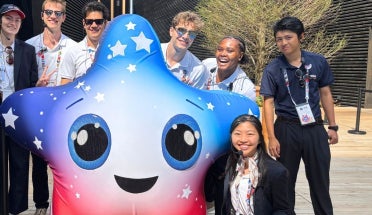
New initiative enables 20 graduate students to conduct research abroad
- Apr 19, 2017
- Education Abroad
As part of a new initiative, Texas Global recently awarded fellowships to twenty graduate students at The University of Texas at Austin to conduct research abroad in the spring and summer of 2017.
Texas Global launched the Global Research Fellowship to support and encourage international research. Granted competitively to graduate students needing to conduct international research or field study critical to their degrees, the fellowship funds up to $5,000 toward travel and lodging.
“UT graduate students conduct ground-breaking research all over the world in the field, laboratories, and archives,” says Dr. Janet Ellzey, Vice Provost of International Programs. “Through the Graduate Research Fellowship, the International Office is delighted to support the research of this next generation of intellectual leaders.”
A total of 86 graduate students from ten colleges and schools applied for the Global Research Fellowship when the first round of applications opened in the fall of 2016. The colleges and schools with the highest concentration of applications were the College of Liberal Arts, the Cockrell School of Engineering, and the Jackson School of Geosciences.
The Global Research Fellowship Committee, comprised of 15 members from across campus, is charged with evaluating the proposals and making award decisions.
Each application is evaluated based on criteria including the benefit of research abroad to degree advancement, existing or potential relationships between UT Austin and international partners, student preparation, strength of the student’s research plan, and letters of support.
Julian Etienne Gomez Baranda, currently pursuing a Ph.D. in Media Studies in the Radio-Television-Film Department of the Moody College of Communication, received funding to support his dissertation on non-theatrical film and small moving image technologies in Mexico after 1950. His research will take place in Mexico City and its surroundings.
“There are very valuable resources here in the US but the kind of intervention I want to make in my field, one that displaces media history toward its margins, requires for me to conduct research abroad,” he describes.
For international students like Etienne, who is originally from Mexico, it is especially challenging to find funding for research.
“Some graduate students and administrators do not always understand that while some of us can compete for funding in our countries to study abroad, such awards do not cover travel funds to actually conduct research,” he explains. “For most of the fellowships and scholarships in the US we are simply not eligible. Applying for the GRF, which doesn’t require US citizenship or residency, was a no-brainer, I couldn’t be more motivated.”
For Justin Power, Ph.D. student in Linguistics, the Graduate Research Fellowship was make or break.
“Grants such as the Global Research Fellowship are critical to graduate students in a number of disciplines whose research takes them outside of the country,” he explains. “Without this type of funding I could not conduct my research.”
Power will be researching sign language in Tajikistan, the influence of Russian sign language, and regional varieties of sign language.
“It is only possible for me to collect data in Tajikistan because that is where signers of Tajik Sign Language live. My research sites are determined by the location of signing communities in Tajikistan,” Power says.
Ph.D. candidate Amelia Sosnowski agrees.
“Grants such as the Global Research Fellowship are absolutely essential to graduate students,” she explains. “Learning to conduct good field work and apply the results within a larger context are invaluable to graduate study.”
Sosnowski’s research centers around the impact of geography and the environment on people. In particular, she will be observing people rearing livestock in Botswana and how vegetation impacts the movements of cattle. Botswana has a semi-arid climate and landscape similar to central Texas, and it is her hope that her findings will have relevance for livestock rearing in Texas.
“I would not have been able to initiate my research and pursue this project abroad this summer without the assistance of a Global Research Fellowship,” she says. “I am incredibly appreciative of the grant and I will be using it to enhance not only my dissertation, but also to disseminate results to academic and also local African audiences.”
Sosnowski intends to bring her findings back to Texas and apply them to agricultural and cattle raising practices domestically.
Seventy applications for the second round of funding are currently under review and award announcements will be made in early May.
“A cultivated mind, one that guards democracy…, is at its heart internationalist. The GRF provides material support to students that want to look, and understand, beyond their borders,” explains Julian Etienne.
In a time when international exchange and collaboration is especially important, the Graduate Research Fellowship fills a need among graduate students to research and collaborate abroad.



